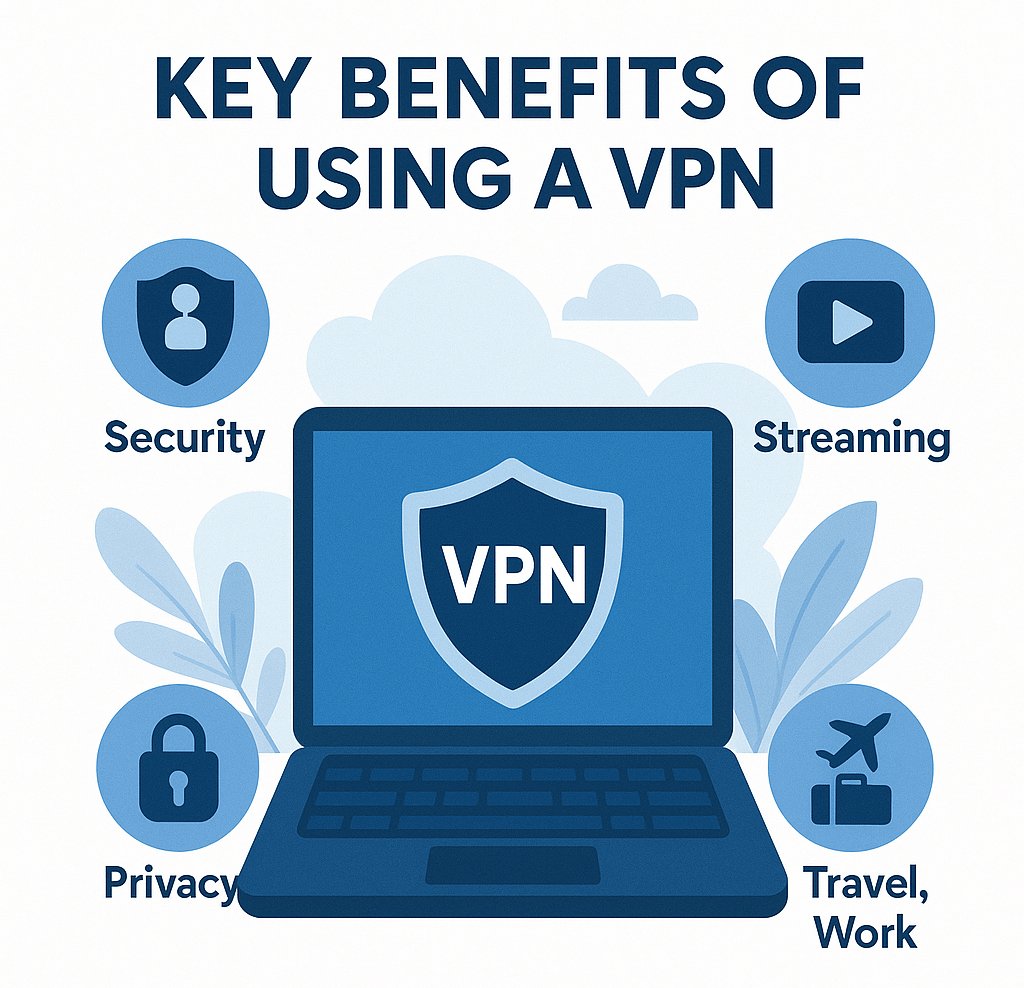Key Benefits of Using a VPN (Security, Privacy, Streaming, Travel, Work)
VPN


Benefits of Using a VPN (Security, Privacy, and Beyond)
The internet has become an inseparable part of our daily lives. From banking and shopping to streaming and working remotely, we constantly share personal and professional information online. But while the digital world brings endless opportunities, it also comes with risks—hackers, surveillance, and geo-restrictions can affect your freedom and safety. This is where a VPN (Virtual Private Network) comes in.
A VPN is more than just a privacy tool; it’s a multipurpose shield that enhances your online experience in ways you might not expect. Let’s explore the key benefits of using a VPN and why it might be worth adding to your digital toolbox.
1. Enhanced Online Security
One of the primary reasons people use a VPN is security. When you connect to the internet without protection, your data is vulnerable to interception, especially on public Wi-Fi networks. Coffee shops, airports, and hotels often provide open Wi-Fi that’s convenient but unsafe. Hackers can easily exploit these networks to steal login credentials, financial details, or sensitive messages.
A VPN prevents this by encrypting your internet traffic. Encryption scrambles your data so even if someone intercepts it, they can’t read or use it. This extra layer of protection ensures your private information remains private.
2. Protecting Your Privacy
Online privacy has become a major concern. Your Internet Service Provider (ISP) can track and log your browsing history, sometimes even selling that data to advertisers. Governments and companies also monitor user behavior to enforce regulations or push targeted ads.
A VPN hides your IP address and routes your traffic through secure servers. This means your online activities become much harder to trace back to you. Whether you’re searching, shopping, or chatting, you gain a level of anonymity that’s otherwise impossible on the open internet.
3. Access to Global Content
Streaming services, websites, and apps often restrict content based on location. For example, Netflix in the U.S. offers a different library compared to Netflix in Europe. Similarly, some news sites or apps may be blocked in certain regions.
With a VPN, you can change your virtual location by connecting to a server in another country. This allows you to unlock streaming libraries, read restricted news, or use apps that might not be available in your region. For frequent travelers, it’s a great way to stay connected to home content no matter where you are.
4. Avoiding Censorship
In some parts of the world, governments restrict access to information by blocking social media, news outlets, or messaging platforms. VPNs provide a lifeline to free information by bypassing censorship walls. Activists, journalists, and ordinary users rely on VPNs to stay informed and connected without fear of surveillance or punishment.
5. Preventing Bandwidth Throttling
Have you ever noticed your internet slowing down during streaming or gaming sessions? ISPs sometimes throttle bandwidth when they detect heavy usage, especially for video platforms or torrenting. A VPN can mask your activity, making it harder for ISPs to identify what you’re doing online. This helps maintain faster, more consistent speeds for streaming, gaming, or downloading.
6. Safer Online Shopping and Banking
When handling money online, security is critical. Online banking sessions, PayPal transactions, or shopping with credit cards expose sensitive information. A VPN adds an extra layer of encryption, reducing the risk of data theft or fraud. Some users also use VPNs to find better deals on flights or hotels, since prices can change depending on your location.
7. Secure Remote Work
Since the pandemic, remote work has become the new normal. Companies use VPNs to allow employees secure access to internal servers, apps, and files. For individuals, using a personal VPN ensures that professional communication and client data stay protected, even when working from home or abroad.
8. Peace of Mind
At the end of the day, one of the greatest benefits of using a VPN is peace of mind. Knowing that your data, privacy, and access to information are protected allows you to enjoy the internet without constant worry.
Conclusion
A VPN is not just about hiding your IP address—it’s about giving you control over your digital life. From enhancing security and privacy to unlocking content and avoiding restrictions, VPNs are versatile tools for anyone who uses the internet.
Whether you’re a casual user streaming movies, a business professional handling sensitive files, or a traveler trying to stay connected, a VPN can make your online experience safer, freer, and more enjoyable.